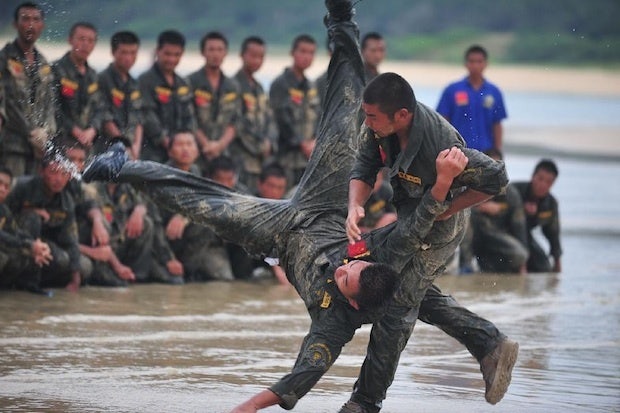
A private bodyguard training program in Sanya, Hainan, held by Ginghis Security Academy. (Xinhua)
Ever since hiring private security was legalized in China in 2010, the country's bodyguard industry has been picking up as its super-rich see a rising need to hire personal protection.
A knife attack in September on China’s second-richest man Zong Qinghou was one event highlighting the reasons that a growing number of members of China’s upper class are fearing for their personal safety. In this case, Zong was attacked by a 49-year old migrant worker who was angry with the billionaire for denying his requests for a job. According to Financial Times:
China has relatively low rates of violent crime and many wealthy people do not bother to hire bodyguards, but the incident reflects rising friction in a society that has gone from centrally planned socialism to one of the most unequal in the world in barely a generation.
“We are seeing a rise in the number of people hiring bodyguards,” said Xin Yang, co-founder of Beijing Yunhai Elite Security Technology Consulting. “Everybody has their enemies, especially rich people in business.”
According to Shi Xingfeng, the Shaolin-trained owner of the Bojing Security Agency who was recently profiled in Economic Observer, this friction is very real—and is the reason for most of his business. According to the article:
Some 80% of Shi’s clients are entrepreneurs, but the majority of them came to him only after having run into trouble. “Usually they have already encountered a real security problem, in general verbal abuse but sometimes even physical confrontations, before thinking about hiring bodyguards.”
Shi also highlights some characteristics of China’s personal security sector which show that it’s still in its early days. Firstly, some wealthy Chinese employers don't seem to be clear about the boundaries of the bodyguard job description:
In the West, if a VIP’s hat has been blown off by the wind, his bodyguards are not to pick it up for him. A Chinese magnate instead expects such services. “The Chinese super-rich have yet to nurture such a concept — a bodyguard is there to protect his safety, not to be his babysitter,” laments Shi.
Meanwhile, a lack of regulation of the budding industry means that some companies may not always have the high standards they should. Economic Observer interviews Chinese security specialist Zhe Meijie:
“It’s a mixed bag,” he says. “We hope that the government will introduce appropriate policies to guide the industry’s development and that practitioners and managers in the sector get better training, as well as learn to cooperate to avoid vicious competition among themselves."
Bodyguard training has military-like rigor, and includes safety aspects such as physical fitness, kickboxing, martial arts, anti-kidnapping, and emergency care, as well as business protocol guidance in decidedly non-physical areas such as legal knowledge, public relations, and social etiquette. This last item is more important than one may think, as many bodyguards are labeled “chauffeurs” or “secretaries” to protect the client’s safety.
For bodyguards-in-training, it looks like the market has much room to grow as China’s wealthy prioritize their personal safety over stigmas against hiring security. At the present time in China, according to Shi, “many rich people are reluctant to hire bodyguards because they believe that it is showing off. They also worry about privacy.”